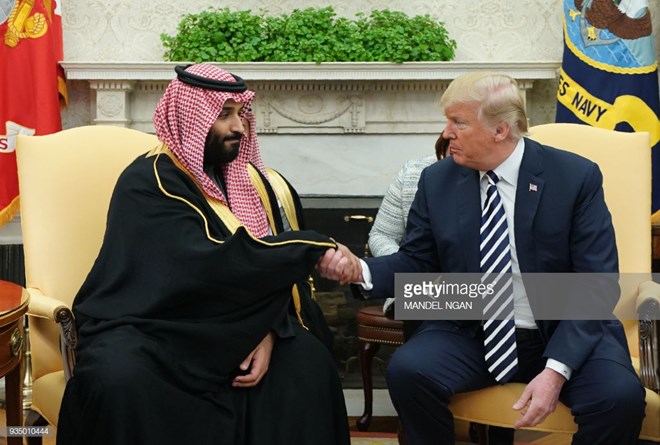Donald Trump doubled down on a multibillion-dollar transaction with the Saudis even after the crown prince allegedly ordered the murder of a journalist. It was the year’s most horrifying whodunit. Who murdered and dismembered the Saudi journalist Jamal Khashoggi inside the kingdom’s consulate in Istanbul in October? The CIA came to the view that the murder couldn’t have happened without an order from the crown prince, Mohammed bin Salman. MbS, as he is known, vehemently denies any role in killing a critical voice, a U.S. resident whose columns in The Washington Post were read all over the world. President Donald Trump, however, isn’t sure, at least in public. “Maybe he did and maybe he didn’t,” he mused in a written statement peppered with his signature exclamation marks. Even more freewheeling in interviews, he has been clearer, saying, “I really want to believe” the crown prince’s denials. After all, there’s so much at stake: $110 billion worth of arms sales, by Trump’s estimation (one that critics say is exaggerated). American values reduced to the value of arms sales? That’s true-to-form transactional Trump. 
Monday January 14, 2019
Lyse Doucet
What would other presidents have done if Khashoggi’s murder had happened on their watch? I put that question to some of President Barack Obama’s former advisers and found that they’d been pondering that exact question. It is hard to imagine Obama publicly contradicting his own intelligence agency. There would have been firm words, even fury—not just in private but in public. And everything in the diplomatic tool kit would have been explored, with some tactics implemented.
But would Obama—or, for that matter, Presidents Bill Clinton, George W. Bush, or George H. W. Bush—have ruptured the relationship with Saudi Arabia? No American leader has likely even considered cutting off a 75-year-old strategic alliance with a dominant global oil producer. In fact, most did what they could to maintain it. Take the war Saudi Arabia launched in 2015 in Yemen against Houthi rebels aligned with the kingdom’s archrival, Iran. Nearly four years on, Yemen is on the brink of a biblical famine; Khashoggi’s murder has now finally refocused attention on this crisis, too. Obama backed the Saudi campaign at the start to show that he still had Riyadh’s back after prioritizing a nuclear deal with Iran. It’s the traditional give-and-take in relationships that matter.
Now Saudi Arabia, and more precisely the young Prince Mohammed, is the linchpin of Trump’s grand plan for the Middle East. The relationship with the kingdom, and with MbS, is crucial, in the president’s view, for preserving jobs as well as for squeezing Iran. And while his predecessors may have made an argument for higher ideals, this president has made clear what matters to him.